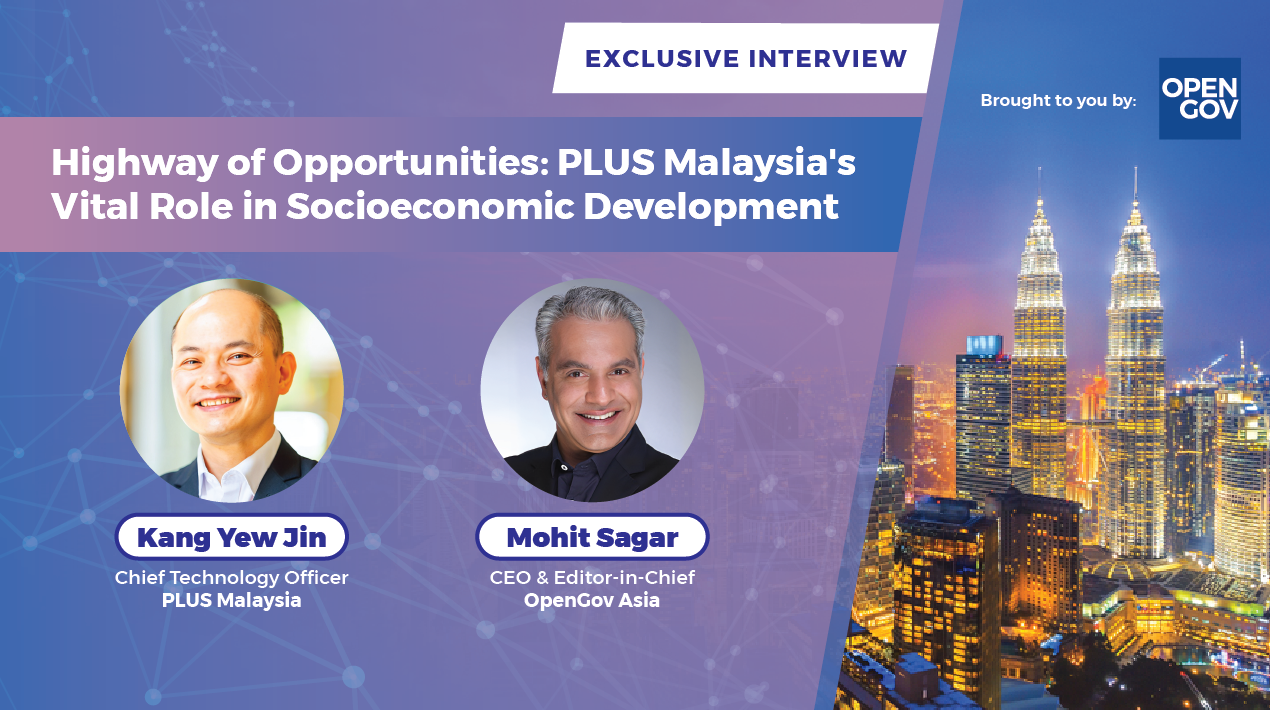
As the largest expressway service provider in the country and one of the largest in Southeast Asia, PLUS Malaysia Berhad (PLUS) plays a significant role in facilitating seamless connectivity for both individuals and businesses. Established in 1988, PLUS is the super highway arm of UEM Group, which holds the distinction of being the largest highway operator in Malaysia.
Recognised as a prominent entity in Malaysia’s toll road industry, PLUS remains committed to upholding and enhancing the quality, safety and efficiency of its extensive expressway network. The organisation acknowledges the pivotal role of a robust and interconnected infrastructure system in fostering the growth and progress of Malaysia’s economy.
With this understanding, PLUS strives to continuously maintain and improve its expressways to ensure seamless connectivity and facilitate the nation’s overall development. By leveraging advanced technology, PLUS aims to proactively address dangerous, life-threatening situations and provide timely interventions to ensure the well-being of individuals and maintain their safety.
In line with efforts to enhance safety, PLUS has implemented an AI system on the Penang Bridge that utilises cutting-edge technologies and surveillance mechanisms to detect and respond to suicide attempts. This system is specifically designed to continuously monitor multiple data points and promptly identify potential indicators of suicide in real-time.
Bridging Distances, Fostering Prosperity
 Kang Yew Jin, the Chief Technology Officer of PLUS highlights that PLUS plays a pivotal role in the overall transportation infrastructure and development of the country, dedicated to providing essential services that facilitate seamless connectivity and contribute to national advancement.
Kang Yew Jin, the Chief Technology Officer of PLUS highlights that PLUS plays a pivotal role in the overall transportation infrastructure and development of the country, dedicated to providing essential services that facilitate seamless connectivity and contribute to national advancement.
Yew Jin reiterates that PLUS Malaysia operates an extensive network of expressways spanning 1,130 kilometres. This comprehensive network serves as a vital link, connecting major cities and towns throughout Malaysia.
Of particular significance is the North-South Expressway, the longest expressway in the country. Functioning as a crucial transportation artery for the entire peninsula, the North-South Expressway plays a pivotal role in facilitating efficient travel and commerce, further solidifying PLUS’ position as a key player in the nation’s transportation infrastructure.
PLUS is responsible for providing effective and safe operation of these roadways, as well as ongoing maintenance and upgrade activities to preserve the infrastructure in good shape and fulfil the needs of the travelling public. Highway operations, emergency response, traffic control, and other associated tasks are among the services provided by the organisation.
In managing Malaysia’s major highways, PLUS plays a key role in the broader economic development of the country. The motorway network, which provides a high-speed, dependable and safe form of transportation, helps to cut travel time and increase connectivity between major cities and villages, which is critical for economic progress.
By providing a dependable and efficient transportation infrastructure, PLUS facilitates the seamless flow of products and people across the nation. This, in turn, supports businesses and trade activities, contributing significantly to the overall economic growth and advancement of Malaysia.
PLUS’s broad use of technology to boost productivity and safety is one of its primary revolutionary characteristics.
“Our PLUSRonda Intelligent Management (PRIME) System is a built-in mobile application installed in all our PLUSRonda patrolling vehicles which replaces the previous manual logging of incidents,” Yew Jin explains.
PRIME enables rapid monitoring and real-time communication of all PLUSRonda actions to the Traffic Monitoring Centre (TMC). As a result, the incident processing time is reduced, allowing PLUSRonda to respond to highway users more quickly, especially in emergencies. Likewise, the digital storage of correct incident information on PRIME enables simpler retrieval of evidence, hence speeding up the relevant processes by respective enforcement agencies.
PLUS’ focus on sustainability and environmental responsibility is another novel characteristic. To reduce its environmental footprint, the company has launched several measures, including the use of solar energy to power rest areas, LED retrofitting across PLUS facilities, and the installation of motion sensor lighting.
The company’s efforts in efficient energy consumption have been recognised through various awards and accolades, Yew Jin reveals. In 2020, they were named as first runner-up for the ASEAN Energy Award and won the National Energy Award for Efficiency Building (Energy Management for Large Building Category). In 2021, they were named the first runner-up for both the National Energy Awards (NEA) and the ASEAN Energy Awards (AEA) for Energy Efficiency Building (Retrofitted Building category).
They intend to stimulate green mobility for highway users by building a nationwide network of Electric Vehicle Charging Stations (EVCS) through the implementation of an EV Charging Station Development Roadmap in 2025. This is consistent with the Low Carbon Mobility Blueprint 2021-2030 (LCMB) and the Malaysian Green Technology Master Plan 2017-2030.
They now have 22 Direct Current Fast Charging (DCFC) electric vehicle charging stations installed along roadways at selected rest and service areas, with additional 18 DCFC stations planned for 2023.
“We are assisting this national goal by constructing infrastructure to facilitate the adoption of EVs in Malaysia,” Yew Jin explains. “Moving forward, we hope to assist Charge Point Operators (CPOs) in utilising renewable energy to power their EVCS, such as by outfitting our charging stations with solar rooftops and solar farms.”
AI-empowered Safety Solutions on Roadways
AI technology enables the development of advanced systems capable of identifying potential warning signs of suicide attempts and taking prompt and appropriate action. These systems can be equipped with a range of sensors, including audio and video cameras, to monitor the traffic on roads and detect signs of suicidal intent.
Yew Jin clarifies that the Penang Bridge AI system’s overall goal is to enable early detection and prevention of suicide attempts, which could save lives and contribute to the safety and well-being of the public. This proactive approach enables swift intervention and appropriate actions to be taken to prevent harm and ensure the safety of individuals on the Penang Bridge.
By utilising advanced technologies and surveillance mechanisms, the system aims to detect early signs of potential suicide attempts and promptly alert the relevant authorities.
“The method uses cameras that are strategically placed along the bridge to monitor the area and detect potential suicide attempts,” Yew Jin elaborates. “The AI system uses machine learning algorithms to analyse live video feeds from the cameras in real-time.”
The algorithms are trained to detect patterns of activity indicative of suicide attempts, such as individuals scaling bridge railings or lingering in specific locations for extended periods. Once the system identifies a potential suicide attempt, it promptly alerts the appropriate authorities, enabling swift intervention to prevent the attempt.
The AI system demonstrates a high level of sensitivity and specificity in identifying potential suicide attempts, ensuring accuracy and dependability. Moreover, the system is designed to be expandable, allowing for its extension to additional areas when needed and enabling the installation of extra cameras to enhance surveillance capabilities. This adaptability ensures that the system can effectively address evolving needs and provide comprehensive coverage for the safety and well-being of individuals in various locations.
Firstly, the system offers early detection and warns authorities of probable suicide attempts before they happen, which can save the need for emergency services to respond to a life-threatening scenario. Authorities can take preventative action, such as talking to the person and offering support, by becoming involved before an actual situation arises.
Second, the solution enables emergency services to allocate their resources more effectively. Early detection of prospective suicide attempts allows authorities to respond with the proper degree of personnel and resources, as opposed to sending out a big emergency response team to handle a crisis.
Thirdly, the AI system can alleviate the psychological burden on emergency services professionals who are often called upon to handle distressing and emotionally challenging situations. By enabling early intervention and preventing suicide attempts from occurring, emergency services personnel may be spared from witnessing or dealing with the aftermath of such events.
The AI system implemented for the Penang Bridge incorporates three alarm levels that are activated based on specific triggers detected by the system.
- Low level (Alarm 1) – This will be triggered when a vehicle is stationary by the shoulder or the lay-by of the bridge. Vehicles detected include motorcycles, cars, vans, buses, trucks/lorries. An alert will be sent if the vehicle is stationary for more than 10 seconds.
- Medium level (Alarm 2) – This will be triggered when 1 or more people walk within the lay-by. An alert will be sent if the person is in the frame for 10 seconds. Another alert will be sent if the person remains in the frame after 30 seconds.
- High level (Alarm 3) – Triggered when one or more individuals are in close proximity to the bridge parapet, exhibiting behaviours such as placing hands on the edge, leaning over, or attempting to climb the parapet. Upon detecting such situations, an immediate alert is generated and sent to the relevant authorities.
“Along the Penang Bridge, the immediate objective is to extend the system’s reach to areas with a high incidence of suicide attempts,” Yew Jin points out. “Currently, the PLUS team has identified a total of six locations, all of which will be covered by this system.”
Continuously improving and optimising the performance of the AI system designed to detect suicide attempts along the Penang Bridge is a crucial next stage. This involves conducting routine maintenance and implementing necessary upgrades to ensure the system operates with the highest level of precision and dependability.
The system could be integrated with additional technologies and data sources, enhancing its capability to detect and respond to potential suicide attempts. Coupling it with other emergency response systems, like ambulance services, can result in a more coordinated and efficient response to suicide attempts.
The introduction of AI into road infrastructure holds the potential to revolutionise transportation systems, making them more efficient, responsive and tailored to the needs of individuals. Roadways are expected to become more interconnected and intelligent.
These advancements will enable motorists to access real-time information and communication capabilities, leading to increased safety, optimised traffic flow and the facilitation of context-aware and personalised services.
Yew Jin believes that the future of AI in roadways is characterised by its dynamic and constantly evolving nature. AI systems possess the remarkable ability to learn and adapt continuously in response to real-world conditions.
This unique attribute empowers them with scalability and the capability to address evolving challenges in roadways and transportation systems. As a result, AI can play a pivotal role in finding solutions to the ever-changing needs of the transportation sector.
“I am confident that forthcoming generations will reap the advantages of AI-powered transportation systems that are increasingly efficient, secure and sustainable, all thanks to continuous research and innovation efforts,” Yew Jin concludes.
















